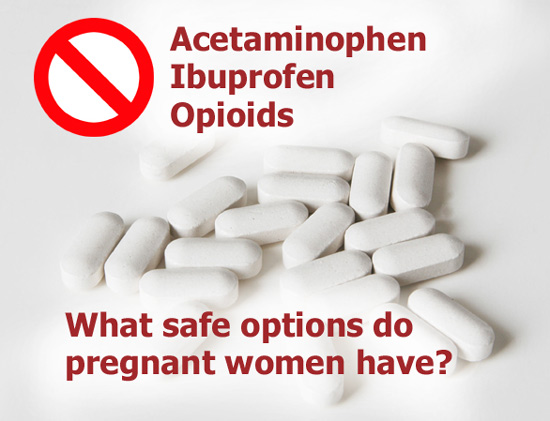More than 90 scientists, doctors and public health researchers are calling for new safety reviews for acetaminophen, the world’s most popular over-the-counter painkiller.
Their concerns are highlighted in a new scientific consensus statement that was published September 2021 in Nature Reviews Endocrinology.
The participating scientists hope to bring attention to the mounting evidence that fetal exposure to acetaminophen can increase the risk of various neurodevelopmental disorders, and can cause permanent damage to the reproductive systems of babies.
Widespread consensus
The ultimate goal of the paper’s authors is to persuade U.S. and European regulators to conduct more intensive research on how acetaminophen affects pregnant women and their babies. In addition, the researchers would like to see more descriptive warning labels on products.
Because of the high risk, pregnant women should completely avoid, or at least take as low a dose as possible, of any medicine containing acetaminophen, say the authors of the paper.
Acetaminophen is also known as paracetamol and is used to treat fever and mild to moderate pain. It is found in numerous generic medications as well as brand names such as Tylenol, Excedrin and Panadol. From products that are 100% acetaminophen to combination medicines, acetaminophen is used in over 600 products.
Becuase it can be obtained over-the-counter, many people don’t think of acetaminophen as a drug; however, it is the most common drug used by Americans, including pregnant women. According to surveys, approximately 65% of pregnant women in the U.S. say they use the medication.
Acetaminophen overdose results in more calls to poison control centers in the U.S. than overdose of any other pharmacological substance. According to Wikipedia, FDA statistics show the United States experiences significant carnage due to over-use of acetaminophen: 56,000 emergency room visits, 26,000 hospitalizations and 458 deaths per year. This data is from the 1990s and numbers are likely far greater today since acetaminophen is in greater use.
New research examines dangers of ‘acetaminophen fetal exposure’
Though gastrointestinal issues are the top adverse effects of acetaminophen, in recent years researchers have started looking more closely at the damage caused by fetal exposure. Specifically, scientists are focusing on acetaminophen’s endocrine-disrupting effects and potential links to neurodevelopmental disorders—like autism and ADHD.
A 2020 birth cohort study found that babies with the highest levels of acetaminophen in umbilical cords had a two-fold higher chance of having ADHD, and up to a three-fold higher chance of having autism.
A Spanish study also linked acetaminophen during pregnancy to autism. In addition, a Swedish study published in the Journal of European Psychiatry found acetaminophen in Tylenol caused language delays for baby girls.
During a press briefing, the authors of the new consensus paper noted that acetaminophen use during pregnancy has been shown to have a range of effects on developing fetuses’ endocrine systems. These side effects include lower testosterone levels, an increased risk of undescended testicles and, according to newer research in animals, impacted ovary development.
Are women in western countries at a disadvantage when it comes to pain treatment?
While the consensus paper may be on the right track in warning women of the dangers of acetaminophen, it will exacerbate the existing problem that U.S. women have in finding “safe” pain treatments.
The FDA recently advised women not to take NSAIDs like ibuprofen during the second half of a pregnancy, and this is in addition to the advisory against taking opioids that has been in place for decades. That leaves few options available for pain relief and fever management—and with that being the situation it will be difficult to get doctors to stop the “Take two Tylenol and call me in the morning” routine for pain treatment.
Sadly, with all the advances in western countries, the problem of “few alternatives” only exists due to regulations that limit treatment to pharmaceutical-based pain medicines only.
Outside western countries numerous options are available. In India, for example, pregnant women widely avail themselves to natural pain treatments provided by Ayurveda Medicine. In China, millions of women utilize Traditional Chinese Medicine, which has provided herbal pain treatment for literally thousands of years.
These two systems operate alongside pharmaceutical-based medicine in these countries, where herbal pharmacies are found at hospitals and densely-populated neighborhoods. Not surprisingly, acetaminophen and ibuprofen overdose hospitalizations are low in these countries.
You may not be able to visit a Traditional Chinese Medicine hosptial in the U.S., but there are supplements that can help tackle the challenges of pain treatment.
Optimal Health Systems offers a potent “pain duo”—one product for acute pain and healing, and one product for supporting longer-term chronic pain.
Optimal Acute
Reduce pain, lower inflammation and heal faster with proteolytic enzymes, tumeric, ginger and acerola cherry.
Learn more here.
Optimal Chronic
A combination of glucosamine, chondroitin, yucca root and more works synergistically to help regenerate cells and lower chronic inflammation. Learn more here.
– – –
Sources: Nature Reviews Endocrinology, Environmental Health News, Wikipedia/acetaminophen, ChildrensHealthDefense.org, JAMA Psychiatry.



